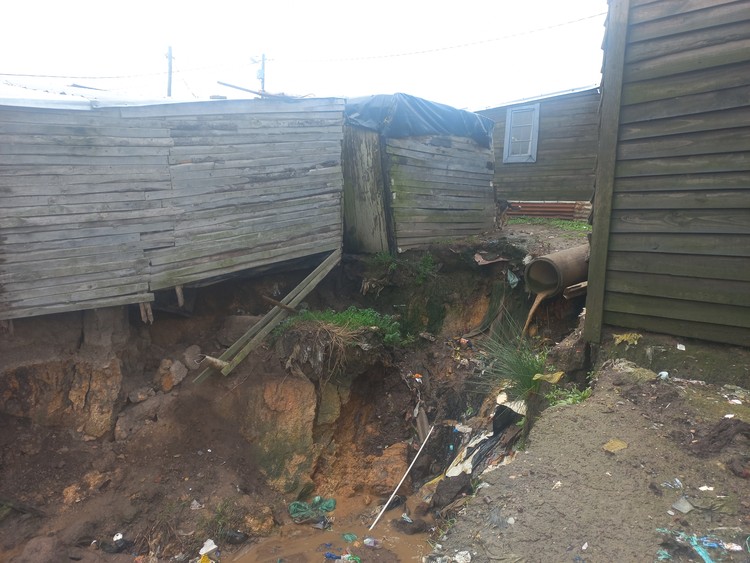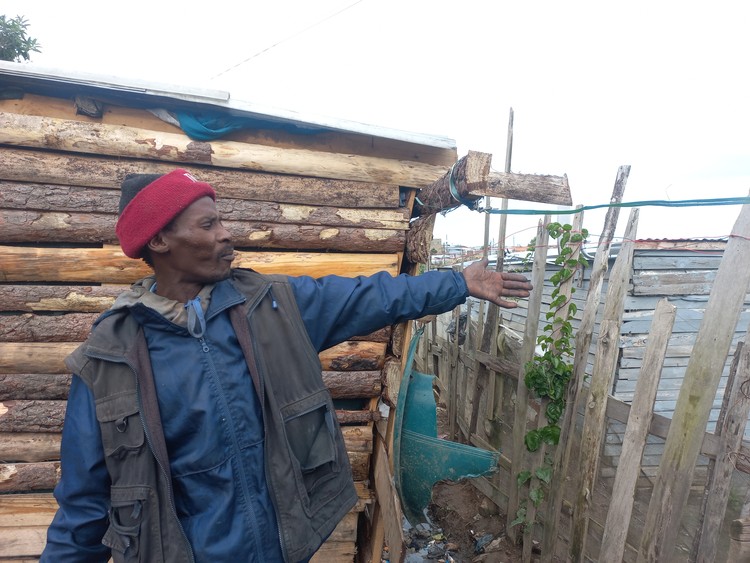Desperate for housing, they occupied mining land. Now they’re worried their homes will collapse
As more people move to George, the city has an acute housing shortage
In December flooding in George caused land to collapse between shacks in eDamini informal settlement. Photos: Siphokazi Mnyobe
- Since 2017, thousands of people have occuped eDamini informal settlement in George.
- Other than about 30 chemical toilets, the occupiers have no services provided by the state.
- Last December, because of heavy rains, the earth between shacks started collapsing. Residents now fear that with further rain their shacks could collapse.
- George Municipality said the occupants were warned about the dangers of erecting homes on the land.
- Over 27,000 people who need houses are registered on the municipality’s database.
“We were desperate for a place to stay because there wasn’t any land available in George,” says Vuyisa Sapepa. He is a leader of the eDamini informal settlement community in Thembalethu, George. A few thousand people live here, a major land occupation that started in 2017. Most used to live in backyard dwellings or were renting RDP houses. They came here to avoid having to pay rent they could not afford.
But the land on which this occupation has taken place was previously used for mining. Heavy rains in George over December caused a chunk of earth to collapse between some of the shacks. Residents are now worried that their entire area is unstable, at risk of collapsing.
The land was transferred to George Municipality from the Western Cape Department of Human Settlements some five years ago.
The community has 32 chemical toilets, but only 15 are open. The rest have been locked by households who are cleaning and maintaining those toilets. Residents have also installed their own taps after growing frustrated with waiting for the municipality to do it. Out of 1,070 shacks, only 40 have electricity boxes and many others are connected illegally to electrical poles.
Many of the shacks are built near a dam wall, adding to residents’ worries.
“When we arrived, the land was muddy like a pigsty but we were desperate to get houses so we decided to erect our shacks regardless,” said Sapepa.
He said the municipality came to demolish their shacks twice in 2017 but they kept rebuilding them.
Resident Khayekethu Mboxo complained about the “unbearable” smell of faeces and urine from waste that people discard behind his shack.
Mboxo moved to the settlement in February. Before that he slept on cardboard boxes under a bridge. He said someone from eNgcobo village in Eastern Cape where he grew up, spotted him and arranged for him to be accommodated at eDamini.
Mboxo survives by doing piece jobs or asking neighbours for food when he has not secured a job for a week.
George Municipality spokesperson Ntobeko Mangqwengqwe confirmed that the land is not suitable for housing or permanent services because it was a mining area. He said the municipality had warned the occupants about the dangers of erecting homes there.
Resident Khayekethu Mboxo complained about the “unbearable” smell of faeces and urine from waste that people discard behind his shack.
Mangqwengqwe said officials are working on formalising older informal settlements in Thembalethu, but this community doesn’t currently form part of any of these developments.
MEC for Human Settlements Tertuis Simmers pointed out some of the province’s housing achievements, and that the R120-million Metro Grounds project would provide George with over 400 houses by 2024. But, he explained: “With the influx of illegal occupiers to the area, the current services provided are not sufficient. Chemical toilets were provided to assist in the interim.”
As of June 2022, the George Municipality had just over 27,000 people who need houses registered on its database.
Support independent journalism
Donate using Payfast

Don't miss out on the latest news
We respect your privacy, and promise we won't spam you.
Next: It’s time to flip the housing delivery model on its head
Previous: Tshwane women turn rubbish dump into vegetable garden
© 2022 GroundUp. This article is licensed under a Creative Commons Attribution-NoDerivatives 4.0 International License.
You may republish this article, so long as you credit the authors and GroundUp, and do not change the text. Please include a link back to the original article.
We put an invisible pixel in the article so that we can count traffic to republishers. All analytics tools are solely on our servers. We do not give our logs to any third party. Logs are deleted after two weeks. We do not use any IP address identifying information except to count regional traffic. We are solely interested in counting hits, not tracking users. If you republish, please do not delete the invisible pixel.


